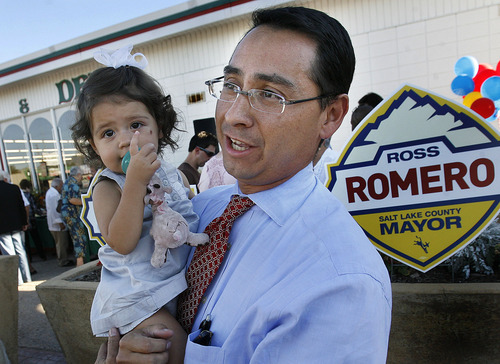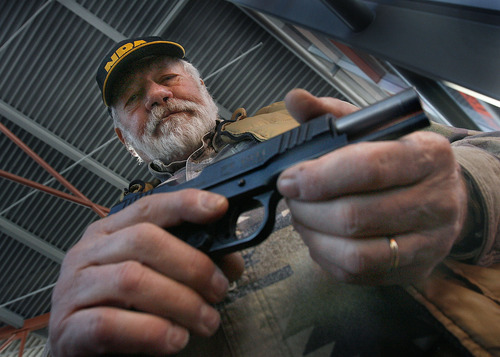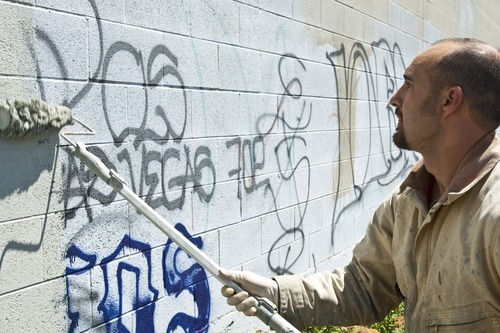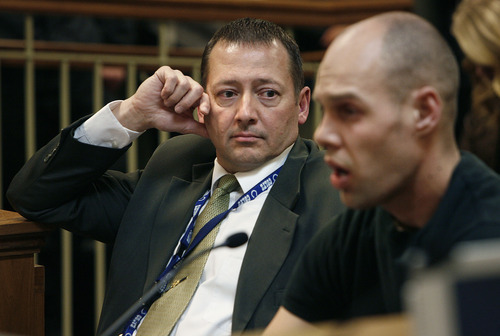This is an archived article that was published on sltrib.com in 2012, and information in the article may be outdated. It is provided only for personal research purposes and may not be reprinted.
In the movie "Minority Report," a man is arrested by police and yells, "I didn't do anything! I wasn't going to do anything."
That world — based on a short story by Philip K. Dick — is one in which cops can determine the intent to commit crime and, thereby, prevent crime. In the book and movie, it's called PreCrime.
The concept of intent came before the Utah Legislature this week with two different bills — each with the same vexing, philosophical problem. The first would have made it a crime to be carrying spray-paint cans or devices that could be used with the intent to deface public or private property.
Sponsored by Sen. Karen Mayne, D-West Valley City, SB107 was fiercely debated on the Senate floor before failing to pass by an 11-17 vote. Most of the lawmakers who opposed the measure feared it overreached.
The other bill, HB49, passed out of a House committee and will be likely debated on the floor this week. Sponsored by Rep. Paul Ray, R-Clearfield, it would prohibit police from arresting someone for disorderly conduct simply for openly carrying a firearm.
But during the committee hearing, concerns about the intent of a person carrying weapons openly — and with the backdrop of Mayne's failed bill — the question of preventing crime versus individual liberty protections met in a muddy middle.
"Everything has shades of gray," said Clark Aposhian, chairman of the Utah Shooting Sports Council. "I wish everything were black and white."
—
Balancing test • Sen. Steve Urquhart, R-St. George, voted against Mayne's anti-graffiti bill because he believed intent to tag property couldn't be determined by only possessing spray-paint cans — though he conceded it might be a helpful tool for law enforcement to crack down on gangs.
In explaining his vote on the Senate floor, Urquhart, an attorney, spoke in stark terms of a trade-off.
"We can cut out so much criminal activity in our society if we think we know who the criminals are and we round them up," he said. "But it would happen at the expense of our liberty."
Urquhart said he could see the same philosophical argument cropping up if Ray's bill gets to the floor for a vote — and he's not sure which way he'd go on it.
"We all like to think we're consistent," he said. "I try to fall on the side of liberty."
But Sen. Luz Robles, D-Salt Lake City, suggested liberty can be achieved only if people are safe to exercise it.
In supporting Mayne's anti-graffiti bill, she said the link between gangs and tagging is strong enough that law enforcement should have that extra tool at their disposal to keep the public safe.
And Senate Minority Leader Ross Romero, D-Salt Lake City, said law enforcement is given an implicit trust by the public to sort out the context of how many spray cans they're carrying and what time of day or night it is.
"In all of these things, we're relying on law enforcement to take their good judgment and implement good policy," Romero, an attorney, said. "Police officers have proven worthy of that deference that is given to them."
—
Defining 'intent' • Kelly Atkinson, government liaison with the Fraternal Order of Police, said his membership is divided on Ray's gun bill. And Rep. Lee Perry, a Republican whose full-time job is as a lieutenant for the Utah Highway Patrol, worried about what calls dispatchers might get and whether they would be well-trained enough to understand the difference between disorderly conduct and a person just carrying a firearm openly.
House Speaker Becky Lockhart, R-Provo, said the Legislature has wrestled with this before and she expects Ray's bill will be hotly debated.
"Intent is a very interesting concept," Lockhart said. "We dealt with this with the hate-crime legislation, and the Legislature came down on the side with letting a jury and court determine intent. But it's a very sticky subject."
Aposhian said whether talking about tools for graffiti or carrying a gun openly on the street, police would likely have to engage in profiling. And whether the person has intent to commit a crime is hard to tell.
But he drew a rough parallel to the U.S. Supreme Court's decision on obscenity.
"It's like trying to define art," he said. "Disorderly conduct — I'd know it if I saw it."
Ray's bill is likely to be heard later this week.
Twitter: @davemontero















